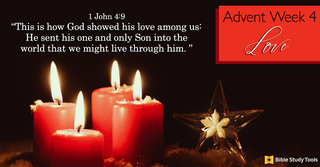
- Recent Translations
- All Translations
Yochanan I 4:19
Share
Settings
Yochanan I 4:19 Meaning and Commentary
We love him, because he first loved us.
] Lest love to God, and so to one another, should be thought to be of ourselves, and too much be ascribed unto it, the apostle observes, that God's love to us is prior to our love to him; his love is from everlasting, as well as to everlasting; for he loves his people as he does his Son, and he loved him before the foundation of the world; his choosing them in Christ as early, and blessing them then with all spiritual blessings, the covenant of grace made with Christ from all eternity, the gift of grace to them in him before the world began, and the promise of eternal life to them so soon, show the antiquity and priority of his love: his love shown in the mission and gift of his Son was before theirs, and when they had none to him; and his love in regeneration and conversion is previous to theirs, and is the cause of it; his grace in regeneration brings faith and love with it, and produces them in the heart; and his love shed abroad there is the moving cause of it, or what draws it first into act and exercise; and the larger the discoveries and applications of the love of God be, the more does love to him increase and abound; and nothing more animates and inflames our love to God, than the consideration of the earliness of his love to us, of its being before ours; which shows that it is free, sovereign, distinguishing, and unmerited. Some read the words as an exhortation, "let us love him"; and others as in the subjunctive mood, "we should love him", because some copies read, "we love God", and so the Vulgate Latin, Syriac, and Ethiopic versions, and the Alexandrian copy, read, "because God first loved us": and so some others.


